- About Us
- Columns
- Letters
- Cartoons
- The Udder Limits
- Archives
- Ezy Reading Archive
- 2024 Cud Archives
- 2023 Cud Archives
- 2022 Cud Archives
- 2021 Cud Archives
- 2020 Cud Archives
- 2015-2019
- 2010-2014
- 2004-2009
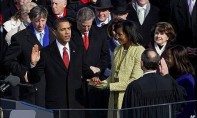 |
Ezy Reading: Some Early Thoughts On The New Obama Administration |
Over the past few weeks it seems that every reporter and cable news pundit around the globe has already taken the opportunity to vomit ad nauseum that, evidently, 'the honeymoon is over' 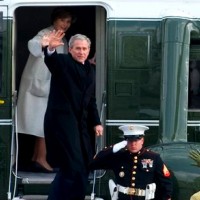 for the new Obama administration. While I won't recycle that overused observation in depth here, we can at least agree that President Obama has indeed been forced to get down to the business of running the United States straight out of the gate, and there are no reprieve vacation days waiting for him on the horizon just yet (a holiday to a spacious, relaxing ranch in Texas, anyone?). But for all this ruminating on the sobering business at hand that has cost Obama the chance to slowly 'ease his way into the Presidency', can we have really been all that surprised that with an economy in crisis and two foreign wars sitting in his 'in' tray that there was to be little else awaiting him than hard, serious work? Perhaps given that his predecessor spent more than a third of his two terms in office on vacation we'd forgotten what a working President looked like.
for the new Obama administration. While I won't recycle that overused observation in depth here, we can at least agree that President Obama has indeed been forced to get down to the business of running the United States straight out of the gate, and there are no reprieve vacation days waiting for him on the horizon just yet (a holiday to a spacious, relaxing ranch in Texas, anyone?). But for all this ruminating on the sobering business at hand that has cost Obama the chance to slowly 'ease his way into the Presidency', can we have really been all that surprised that with an economy in crisis and two foreign wars sitting in his 'in' tray that there was to be little else awaiting him than hard, serious work? Perhaps given that his predecessor spent more than a third of his two terms in office on vacation we'd forgotten what a working President looked like.
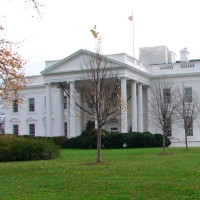 And yet there's little doubt that Obama and his administration deserve at least some blame for making things harder on themselves then they needed to be. Initially the transition phase seemed smooth and fairly flawless, but those responsible for the vetting of his cabinet nominees clearly made a series of unconscionable mistakes given they knew how Republicans — and the right wing media — would be waiting in the wings with sharp knives at the ready, alert for any opportunity to regain some traction after McCain's failed Presidential bid. First New Mexico Governor Bill Richardson withdrew his name from consideration as Commerce Secretary back in January over Federal investigations into improper political donations. Next came the embarrassing non-tax paying Democrats who were forced to withdraw — Nancy Killefer, who had been nominated as White House Performance Officer, and Tom Daschle, nominated as Health and Human-Services Secretary. Even highly touted Timothy Geithner had to answer some awkward questions about unpaid taxes before he secured the position of Treasury Secretary.
And yet there's little doubt that Obama and his administration deserve at least some blame for making things harder on themselves then they needed to be. Initially the transition phase seemed smooth and fairly flawless, but those responsible for the vetting of his cabinet nominees clearly made a series of unconscionable mistakes given they knew how Republicans — and the right wing media — would be waiting in the wings with sharp knives at the ready, alert for any opportunity to regain some traction after McCain's failed Presidential bid. First New Mexico Governor Bill Richardson withdrew his name from consideration as Commerce Secretary back in January over Federal investigations into improper political donations. Next came the embarrassing non-tax paying Democrats who were forced to withdraw — Nancy Killefer, who had been nominated as White House Performance Officer, and Tom Daschle, nominated as Health and Human-Services Secretary. Even highly touted Timothy Geithner had to answer some awkward questions about unpaid taxes before he secured the position of Treasury Secretary.
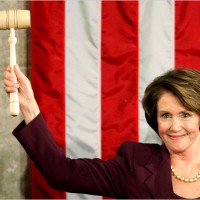 Geithner then of course went on to now famously issue his disastrous, all-generalities-no-specifics testimony to the Senate Banking Committee that induced an all-out panic attack on Wall Street. Though the complexities of this financial mess meant, to be fair, that there probably weren't a great many specifics he could offer at this time (which is code for 'right now none of us has a damned clue about how this might play out') it wasn't even close to providing the image of confidence and assurance that the new Treasury Secretary needed to convey, and in this respect he and his minders committed a major misstep. At least Geithner can be credited with offering 'something' as opposed to those Republicans who would still have us do nothing while waiting around for the market to simply 'correct itself' out of the mess.
Geithner then of course went on to now famously issue his disastrous, all-generalities-no-specifics testimony to the Senate Banking Committee that induced an all-out panic attack on Wall Street. Though the complexities of this financial mess meant, to be fair, that there probably weren't a great many specifics he could offer at this time (which is code for 'right now none of us has a damned clue about how this might play out') it wasn't even close to providing the image of confidence and assurance that the new Treasury Secretary needed to convey, and in this respect he and his minders committed a major misstep. At least Geithner can be credited with offering 'something' as opposed to those Republicans who would still have us do nothing while waiting around for the market to simply 'correct itself' out of the mess.
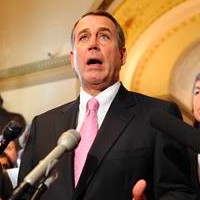 More recently came news of the unexpected and yet, in some ways, wholly 'expected' departure of Republican Judd Gregg who, after Richardson's exit, was nominated as Commerce Secretary for Obama's 'bipartisan' cabinet. By all accounts Gregg actively lobbied for the position and so it seems clear that while he cited 'irresolvable conflicts' over such matters as the 2010 census and the Obama stimulus bill as reasons for withdrawal, the real truth of his farcical about-face is arguably far simpler: the GOP got to him. Vetting of Gregg's core political philosophy should have tighter, but this stood as a potential risk to happen on the evidence of the Republican Party's behavior over the last few weeks. Namely, they ain't playing fair.
More recently came news of the unexpected and yet, in some ways, wholly 'expected' departure of Republican Judd Gregg who, after Richardson's exit, was nominated as Commerce Secretary for Obama's 'bipartisan' cabinet. By all accounts Gregg actively lobbied for the position and so it seems clear that while he cited 'irresolvable conflicts' over such matters as the 2010 census and the Obama stimulus bill as reasons for withdrawal, the real truth of his farcical about-face is arguably far simpler: the GOP got to him. Vetting of Gregg's core political philosophy should have tighter, but this stood as a potential risk to happen on the evidence of the Republican Party's behavior over the last few weeks. Namely, they ain't playing fair.
This has nothing to do with asking for a government to be free from the checks and balances of an opposing political party, and indeed the Republicans, if they have any integrity, shouldn't fold over easily and should stand by their ideals. That said, the entire sordid experience of the now-passed $789 billion stimulus package clearly indicated that right now, regardless of the urgency to take action sooner than later on the economy, many Republicans are more interested in engaging in party politics than in moving forward under a new Democratic administration. In many ways it reeks of a group still acting petty and upset over losing the election, and given the countless missteps and massive unpopularity of the George Bush era Republicans like House Minority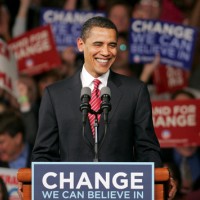 Leader John Boehner are, frankly, showing some incredibly misplaced testicular fortitude to think they still have the electoral leverage to play spoiler like this. Sure, some Democrats like Nancy Pelosi and Barney Frank have undoubtedly been a little too over-zealous in relishing the chance to finally kick sand back in Republican's faces since Obama's November victory, but Obama himself — true to his campaign promise of building a bipartisan, cooperative government — has made countless overtures to his opponents that haven't deserved this level of rebuke. From the ceremonial — honoring McCain at a bipartisan dinner on the eve of his own inauguration — to the politically substantial — including Republican-requested tax breaks in his stimulus package — the President has tried to be inclusive and open to opposing views. Once again drawing back with a comparison to the previous administration's modus operandi, we need to remember that Obama doesn't have to play fair, either — he has the electoral mandate; he has the political leverage.
Leader John Boehner are, frankly, showing some incredibly misplaced testicular fortitude to think they still have the electoral leverage to play spoiler like this. Sure, some Democrats like Nancy Pelosi and Barney Frank have undoubtedly been a little too over-zealous in relishing the chance to finally kick sand back in Republican's faces since Obama's November victory, but Obama himself — true to his campaign promise of building a bipartisan, cooperative government — has made countless overtures to his opponents that haven't deserved this level of rebuke. From the ceremonial — honoring McCain at a bipartisan dinner on the eve of his own inauguration — to the politically substantial — including Republican-requested tax breaks in his stimulus package — the President has tried to be inclusive and open to opposing views. Once again drawing back with a comparison to the previous administration's modus operandi, we need to remember that Obama doesn't have to play fair, either — he has the electoral mandate; he has the political leverage.
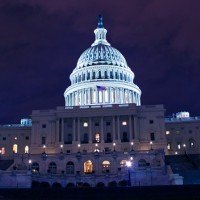 And so maybe this is part of the problem, one that reared its head at times during Obama's campaign last year when it appeared that the McCain-Palin ticket may just be building enough momentum to overtake him: Obama has a tendency to play too nice. His professed allegiance to the triple threat ideals of honor, integrity and hope were a large part of what got him elected, and he certainly took a far higher road to victory than McCain took in defeat. At the same time, it wasn't until Obama started to let loose with stronger, more aggressive counters on the campaign trail, in his political ads, and in the debates that he really managed to finally, conclusively shut out McCain.
And so maybe this is part of the problem, one that reared its head at times during Obama's campaign last year when it appeared that the McCain-Palin ticket may just be building enough momentum to overtake him: Obama has a tendency to play too nice. His professed allegiance to the triple threat ideals of honor, integrity and hope were a large part of what got him elected, and he certainly took a far higher road to victory than McCain took in defeat. At the same time, it wasn't until Obama started to let loose with stronger, more aggressive counters on the campaign trail, in his political ads, and in the debates that he really managed to finally, conclusively shut out McCain.
Comedian Bill Maher recently joked with CNN's Larry King that the experience of passing the stimulus package should have finally proven to President Obama that with the exception of Senators Arlen Specter, Susan Collins and Olympia Snowe there are in fact no moderates left in the Republican Party. In a way, he's not far wrong. If that is indeed the case and, to boot, Republicans appear to be less interested in finding workable solutions than in standing pat with only stubborn refusals and angry indignation, then the pressing nature of matters at hand demand that Obama recognize the time for warm and fuzzy good-intentions is now over. 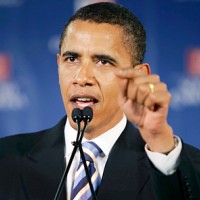 Obama rightly deserves credit for shifting towards the center and trying to curry Republican favor — many of his newly elected Democrats who won in traditionally red states in November are, after all, centrist, otherwise they'd have never won in the first place. I'm also not willing to suggest that Obama become the 'decider' and banker of 'political capital' that Bush so arrogantly declared of himself in past years. But the early experiences of this new administration are that they are letting easily avoidable mistakes and an immovable opposition place further obstacles across what was an already difficult enough road ahead. The time for Obama to use his electoral mandate is now. Waiting for Republicans to come around and hope they might rediscover their conscience simply won't do.
Obama rightly deserves credit for shifting towards the center and trying to curry Republican favor — many of his newly elected Democrats who won in traditionally red states in November are, after all, centrist, otherwise they'd have never won in the first place. I'm also not willing to suggest that Obama become the 'decider' and banker of 'political capital' that Bush so arrogantly declared of himself in past years. But the early experiences of this new administration are that they are letting easily avoidable mistakes and an immovable opposition place further obstacles across what was an already difficult enough road ahead. The time for Obama to use his electoral mandate is now. Waiting for Republicans to come around and hope they might rediscover their conscience simply won't do.
Ezy Reading is out every month. Send your comments to feedback@thecud.com.au
